Kate Bowler: Well, hello there. I’m Kate Bowler, and this is Everything Happens.
This is a podcast about those times in life where everything is swimming along, and then suddenly you’re drowning. The divorce, the pink slip, the diagnosis. This is about befores and afters and how sometimes before was better. Today, we’re going to talk about caregivers, the people whose hearts are broken when your life falls apart. The people who are helping you pack boxes after your husband leaves you, or pitch in with childcare, or count out the medication because you can’t do it on your own. This is about the village.
When I got sick, it took me a while to realize that I wasn’t alone in this. There were so many people around me who were carrying me, and frankly, sometimes they got tired. Everyone can get to the point where there is nothing left. They are giving, and giving, and giving, and they can actually run out, and I’m not sure I noticed that before.
Today, I want to introduce you to Mark Lukach. During his freshman year of college, Mark met Giulia, a gorgeous, successful Italian woman, and they fell in love. At 24, they were married, and moved to California to start their lives together. Giulia would continue to climb the corporate ladder, Mark would teach, and everything was going according to plan. But then, mental illness gripped their lives and turned their plans upside down. Mark tells their story in a gorgeous memoir called My Lovely Wife in the Psych Ward.
Mark, I am so excited to be talking with you today.
Mark Lukach: Kate, thanks so much for that intro. It’s great to be talking to you, too.
KB: Well, I mean, at the beginning of your book, you just fall in love with your love, and I think part of the amazing thing is realizing our lives are just made up of these tiny, boring, totally amazing details, and you fell in love with all the details of Giulia. So what drew you to her when you first met?
ML: Well, I would say at the core, it was her smile. Giulia has… You know back on Instant Messenger days, Giulia’s IM name was Gsmile, because her name is spelled with a G because she’s Italian, and the first thing you see and the last thing you forget is this gigantic, radiant smile. And I actually heard about her first because I was unpacking my dorm room. I had literally been at college for an hour, and this guy on my hall comes running in, we start chatting, and he’s like, “Apparently, there’s this gorgeous Italian girl whose in our grade.” And I was like, “Oh.” And it kind of started already there for me. I was the fish, there was the hook, and I went for it immediately.
KB: That’s so awesome. And I love the fact that you refer to it as ‘grades’, that’s how you know how old you were. You were like 12 years old, and you were already…
ML: Yeah, exactly. So we met, maybe day two of the orientation stuff, and I was super intimidated. She was, in fact, very, very beautiful and had this radiant smile. And my way of dealing with being intimidated by her was to not actually talk to her.
KB: Smooth.
ML: Instead … Yeah, right? Good call. So instead, I yelled at her. There was this movie out called “Life is Beautiful”, which is an Italian movie, and the protagonist, he says, “Buongiorno, Principessa!” Which means good morning, princess. He sort of yells that out at really inappropriate times to this woman he’s falling in love with. So I was like, I’m going to do the exact same thing with this Italian girl. So I’d see her across the quad going to class at 9 AM, and I’d yell out, “Buongiorno, Principessa!” And it always got a smile, it always got a little chuckle, which was good. And it meant I didn’t actually have to have the courage to really have a conversation.
KB: Yeah. And then one day, she’s like, “I think I’m in love with the guy that yells at me all the time.”
ML: Well, what happened is we met at a party, and we actually started talking. This was, like, three weeks into being in college, and from that moment on, I think we were Mark and Giulia.
KB: And you got married pretty quick after college, and had this really beautiful life. You had surfing right down the road, and this cute little bulldog named Goose, and she got her dream job, and everything seemed perfect, until it wasn’t. Do you mind telling me what happened?
ML: Sure. So we moved to California literally the day after we got married. We knew nobody in San Francisco. We created this happily ever life together, and Giulia, who is, as you said, she’s super, super successful, very ambitious. So she got this job, and it was at a very cool company where she really, I think, wanted to fit in. It was during the summer, so I was off because I’m a teacher. So I was home when she came home from work, and it was literally on that first day that I noticed an insecurity and a lack of confidence that I had never seen in Giulia up to that point. Granted, we’re young at this point, we’re only 27, but we still had known each other nine years, so it was pretty striking to see. It was like she wasn’t really clear if she was going to fit in, she was kind of intimidated by how smart everyone was, and how hip this whole vibe was, and I just kind of tried to encourage her and remind her of how successful and smart she is, but that seed of insecurity very, very quickly grew and spiraled out of control. And it kind of manifested itself in different ways.
ML: The first thing I think was just her feeling stuck at work, like she would just get a really simple task and wouldn’t know how to go about it, and would sit there and stare at her computer, and then she might call me or email me for help. And then at home, she kind of lost her appetite and wouldn’t really eat dinner. We’d sit down, and she’d kind of poke at it, but not really eat much. And then she started to lose the ability to sleep at night, and that was when things really got hard because I felt like I could help her. Like, she would send me emails, and I would proofread them and send them back to her. I could help with that. I could cook for her and try to encourage her to eat, but it’s really hard to stay awake with someone and try to get them to go to sleep. So it really exploded when she started to have delusions, and she, in the nights awake would say she was having conversations with God, or having conversations with the devil, and that’s when I got really, really scared, and ended up taking her to the emergency room.
KB: What was that moment like for you?
ML: We took her to the hospital, and my expectation of how mental health works was that they were going to basically give her a pill, send her home, and maybe a day or two later, she’d be sleeping, and she’d be fine. And instead, they were like, “We don’t really know what’s going on. We know what symptoms she has. She’s acting psychotic.” I didn’t even know what that word was at the time, but basically it meant extreme paranoia, hallucinations, agitated, racing thoughts. So they admitted her to the psychiatric hospital, and that was really when I felt like our life flipped upside down.
KB: And, I mean, in the process it actually took to get her into a mental health facility, it sounds like it absolutely broke your heart. It was really callous, and then it took weeks to get a diagnosis. You write, “With one word, I lost my wife and gained a lifelong patient.” And I think that’s something that a lot of caregivers can really relate to.
ML: Well, you know, I felt so central to what was happening to Giulia because I was married to her and I knew her really well, and I felt like the doctors and the nurses, they did not see me as central. They thought, ‘We’re going to deal with the woman who’s sick. Okay, this is her husband who loves her, but he should just be in the waiting room, and we’ll give him an update when we have one.’ You know?
KB: Yeah.
ML: I just felt so helpless. I was offering every detail I could to anyone who would listen, but it was always kind of just like, ‘Well, let’s wrap it up. We’ve kind of got to go deal with your wife here. And I’m thinking, ‘Well, how can you help her mental state if you don’t know who she is? I’m trying to help you understand who she is.’ And I was really impatient for a label for it because my thought was, once we can label what she has, then we can know how to fix what she has.
KB: Yeah.
ML: And the first label they gave was a really scary one. They thought she had schizophrenia, and that was where I felt like, oh my God, here I am, 27, I’ve been married for three years, and I guess this means that for the rest of our life, Giulia is going to go through stuff like this.
KB: Yeah, because then you don’t just have a trauma, you have to learn a whole new language, a whole new series of categories and ways of framing life.
ML: Yeah. Now, I should say, though, they subsequently changed her diagnosis two times as her illness continued to unfold, and she did face future hospitalizations. Giulia’s been in the hospital three times. But the diagnosis that they have now and the one that has led to the medication treatment that seems to be working for her is that she has Bipolar Disorder. And that generally means a lifelong condition with highs and lows. And for Giulia’s highs, a lot of people who are bipolar, they experience manias, something that’s really fun, where you feel super creative, and you’re really outgoing, and you want to party and spend lots of money. But Giulia’s mania feels psychotic, so it’s actually really scary and unfun, and then once that resolves, she ends up facing a really, really deep and dark depression.
KB: I was recently watching the movie The Big Sick, have you seen that?
ML: What a great movie. What a great movie.
Speaker 3: Hello.
Speaker 4: No, please sit. Please sit. I’m Doctor Cunningham, MOE’s attending. I’ll be coordinating all the doctors and orchestrating her treatment strategy.
Speaker 3: All the doctors? How many are there?
Speaker 4: Five.
Speaker 3: Five? Why so many? Is that normal?
Speaker 4: Yes. It’s standard for patients in the ICU. We come at it from many angles, we confer-
Speaker 5: We’re assessing her. We immediately initiated our tracheal intubation. Thankfully, it hasn’t effected her heart at this point-
Speaker 6: We don’t know the exact nature of the infection yet, but we’ve got her on broad spectrum antibiotics-
Speaker 7: Critical infection, centering around the-
Speaker 8: Our theory is methicillin resistant staphylococcus aureus.
Speaker 9: Hold, on that’s an F or a PH?
Speaker 8: PH.
Speaker 10: That was very reassuring, wasn’t it?
KB: When I watched it, I watched it by myself, and I was seeing it from the patient perspective, the main character, and she has this whole unfolding medical situation, but I watched it with my husband, and he’s not a super emotional guy, and I just saw him absolutely tear up, and I realized he was watching it from the caregiving perspective of the person who is listening to all of that disorienting language, and just trying to figure out which way is up. When I read your book, you just get this sense of the overwhelming loneliness and disorientation of that period.
ML: Yeah. Exactly. I kind of, I think it was a product of privilege and upbringing, but I kind of felt like the master of my domain. I was living the good life and was in the driver’s seat of it, and all of a sudden, it’s like, boom. My wife is locked away in a hospital, I didn’t know what the future held, and I didn’t feel like there was anyone I could talk to who could understand me. Retrospectively, in particular, I feel really bad. I know, my parents, it was really hard for them. They really didn’t know how to support me. And then it’s interesting because then the network of caregiving, it becomes like a ripple that goes out. So I was the caregiver for Giulia, and I was sort of on the front line, but then there was my parents and her parents, and then there was my siblings, and then our friends. And then my parent’s friends who might want to support my parents. So it’s this really-
KB: Circles, and circles, and circles out. Yeah.
ML: Exactly. And the way my thinking has really shifted around illness and especially mental illness is I think we get trapped looking at it as one person experiencing it, and we forget those webs, and those circles, and those networks of people who I think have so much capacity and desire to help, and to be part of the solution, but there isn’t often the invitation to be part of it.
KB: I’m also just aware in talking with you that there are just some situations that are easier to get help with than other situations. I mean, there’s a lot of stigma. I have a casserole problem. That’s how I think about it. I have a problem, and then people bring me stuff to eat.
ML: You get the food menu thing?
KB: Yes.
ML: The calendar, right? Everyone puts up their name on the calendar and signs up.
KB: Yeah, I’m prime caring bridge material here. And I was just wondering if it was hard, do you think, to get help for what you really needed?
ML: You know, I will say that when I went through this, I often thought of what if Giulia had been diagnosed with cancer, how would this be different, right? And I actually think the hardest part, Kate, was that I lost Giulia. I couldn’t talk to her about the choices I had to make, what the best treatment was because she was either delusional or so depressed and so heavily medicated that I could barely get a few words out of her. So I think when it’s physical, obviously there are emotional and mental components to it, and the person is still mostly intact intellectually, mentally, emotionally, and they can be a collaborator through the solution, but I felt like my partner, who I would of course call unto otherwise, now I couldn’t. So anyone else I turned to, they just weren’t my go-to person. So I think that was the hardest part for me.
KB: I imagine it was hard for you not to feel like, ‘Man, I gave up a lot of stuff.’ You had to give up your job, you had to give up, I think, probably feeling your own age. Like you’re probably 12, and season of life, you’re looking around, and everyone is excited about the next concert tickets or whatever, and you’re just like, ‘Oh my gosh. When did I get the worst adult problems, and how long do I have to carry this?’
ML: Yeah, exactly. That is such a great description, and I think that absolutely added to my sense of resentment. I went and I saw a therapist throughout all this because I needed to process, and she was so helpful, and she gave me space to feel that resentment, that it was okay to feel hurt that life was not easy anymore, and it was okay to feel mad about that even. So rather than, now bury that in layers of shame and guilt because I’m mad at someone who is experiencing something out of her control, my therapist really helped me to be like, “Okay, you feel that. Now, let’s honor it, and then let’s let it go.”
KB: I’ve only been the patient, so it’s hard … it took me a while to even realize that loving me was really hard on people.
ML: Yeah.
KB: And that made me feel really guilty. Like everyone I touch basically has to go to therapy.
ML: Yeah, and that was what, for me, the biggest challenge of all this has been. It was obviously super scary, and really isolating, and there was tons of fear and all that stuff, but I think the thing that I had to grow into the most and that Giulia had to grow into the most was the challenge of open communication.
KB: Well, there’s so many examples that you have of how hard it is to really listen, like, when she’s describing that she wants to end her own life, and I’m sure everything in you just wants to jump up and fix everything before even letting her finish the sentence.
ML: Exactly. I needed to really hear her pain of being psychotic and not trusting her own mind, and feeling so depressed she wants to kill herself and end her life, and I needed to hear all those things and not judge her. But then the challenge, Kate, was then, after Giulia got through her first episode and was feeling better, she had to learn that same challenge of listening to me because now it was my turn to feel bad, and it was my turn to put my guard down and really let myself grieve. And she was like, ‘Dude, what’s going on? I’m better. Let’s have fun. We’re back to the good old days.’ And I’m like, ‘No, no, no. You don’t understand. I just bottled up all these feelings for almost a year to hide them from you, now I need to actually let them out.’ So it was kind of her challenge and her turn to have to go through the listening. And I think only by actually truly hearing each other do I feel like we can not burn bridges, and instead repair and even make more beautiful bridges with each other.
KB: I was really moved by you having Jonas in your life. You have this little baby, and it fills up your life. And like you said, “Then life falls apart again.” But at this point, Jonas is two months old when Giulia relapses. So how did having a son change things that time around?
ML: After Giulia’s first episode, she was in an outpatient program with her depression for about nine months, and then she just kind of snapped out of it.
So we kind of just went back to living, and one of the things we really wanted to do was have a child together. So she got pregnant, she took an extended maternity leave, she was actually home for five months, and then, when he was five months old, she went back to work, and she was only at work for two and a half weeks before she had a relapse of psychosis, it was her second episode at this point. So I had Giulia in the hospital, which felt strangely familiar because we had gone through it, and I kind of felt like I was dusting off an old outfit that I knew very well and putting it back on to play this role, but it was actually one of the doctors who said, “You have no idea what you’re doing because now you can’t just focus on Giulia, you have to focus on this baby. And you have to continue to give this baby everything that he needs, while you also need to support your psychotic wife.” Knowing that what likely will follow is a suicidal depression.
And I’ll be honest, Kate, I don’t know if there’s an actual line that you cross where you feel suicidal, but I felt pretty darned close, where I was like, ‘I just don’t think I can do this.’ Like, ‘I don’t think I can be here for both of these humans who need such different things from me. How the hell do I be a father and a caregiver?’ And I just kind of crawled through it all, barely making it.
KB: I also feel like being a parent saved me in a lot of ways.
ML: Yeah.
KB: Let me run this by you, then.
ML: Sure.
KB: So they don’t care about your problems, not a lot, anyway. Just a little. Enough to know that they’re going to get the juice box. Their time has a weird quality to it, like, it’s kind of unspooling, and then it’s just a puddle, and you get to live in that splashy pond with them called snack time, or let’s go swimming. I don’t know. I find there’s a different kind of mode I get to be in that is not quite the same as managing. I mean, yes, it has caregiving elements to it, but I feel like Zach has helped teach me how to feel alive again. Does that make sense to you?
ML: One hundred percent. I one hundred percent agree. I love the joy of parenting. Look, it’s super hard, and it’s exhausting, and isolating, and all those other things, but gosh, those moments when, whether you’re in the baby phase or toddler, or even, now Jonas is six and a half, and the delight that they bring to life, it’s like the boost. You just feel like you’re in Mario and you got a star, and you’re just plowing through everything on turbo charge mode because they just make you feel so amazing, you know? So that was super interesting because I was going back to fearful grieving mode for Giulia, and meanwhile, I’m having these jaw droppingly beautiful moments on the beach with our baby learning to crawl, and just being like, does life get better than this? At the same time that I feel, does life get harder than this?
KB: Yeah, that’s right. And then sometimes the fragility of everything makes the beauty even more surreal. Yeah. You describe this feeling where the crisis is over, but then the world doesn’t go back to the way it was, and I love when you compare it to a tsunami. Can you tell me what that means to you?
ML: Sure. It’s as if we were on the beach in Thailand on a vacation, and all of a sudden, the wave came through and swept everything away, and we somehow were able to hold onto each other and survive it, but then once the sea recedes, you look around and you realize things have been demolished, and you’re going to have to rebuild, and you’re going to have to, in many ways, start from the ground up. And I think when we got tsunami-ed by mental illness, we kind of had no choice but to work to repair our marriage. So what became front and center was like, yeah, we were pretty happy together, but now we can’t ignore this issue that was really easy to ignore before because we were generally having so much fun together.
When you knock down a house and you’re going to rebuild it, all of a sudden, you’re like, ‘Well, we never really liked the bathroom, so let’s fix the bathroom.’ So it was the same thing in terms of how we had to approach being married. And that was hard, but my God, now I’m 36, we actually have a second child together, it’s been four years since Giulia’s had her third episode, and I feel like by doing all that heavy lifting and doing all that repair work, it really does feel like we’re reaping the benefits, and we almost have a 60 year old marriage rather than a mid-30s marriage because we’ve had to face this stuff.
KB: Yeah. There is this song that you talk about like it’s a motto. So my family growing up had a song that was a motto, but it wasn’t nearly as informational as yours. It was something about pirates and beer. But you talk about how you are true believers. So is this super weird if I ask you if you wouldn’t mind singing that for me?
ML: So when I was in high school, I got into punk, and there’s this band called The Bouncing Souls, and I would love to give them a shout out because here I am, 20 years later, still in love with these guys, and they have this song called True Believers and a tradition that Giulia and I started very early in our marriage, we called it dishwasher dance parties, where after dinner, we’d crank up music, and as we cleaned the kitchen, we’d dance our way through it and have a lot of fun. So when we had a baby, we sort of restarted dishwasher dance parties, and I’d dance around the house with him on the chest Bjorn, and then as he became a dancer, he’d do it. So one of our go-to songs was a song called True Believers, and I think the reason it’s become so important to me is because Jonas started listening to it when he was like two, and when he was two and a half, he asked me about it because he had been listening, and he wanted to know what a true believer was.
KB: What did you tell him?
ML: I was confronted with, like, oh my God, this is maybe the most important question he’s ever asked me at this point. I really need to say it right. And what was so amazing is that I didn’t actually have to answer him because he answered, and he said, “I know what a true believer is, Dad. I’m a true believer.” And I was like, “Yeah, you are.” And then he’s like, “You’re one, too, Dad.” And this was in a moment where Giulia was still in a really fragile place, so he asked me if Giulia, he’s like, “Is Mom a true believer?” And it was so important to me that he say yes, not me. I needed him to see her as part of that tribe. So I sort of turned it back on him, I was like, “Well, what do you think? Do you think Mom’s a true believer?” And he was like, “Yeah, she is a true believer.”
So ever since then, that song has held a hallowed ground in my family lore. So here’s the caveat, right? I’m not very good at guitar, I’m not very good at singing, so that’s where my skill set is.
KB: I love it.
ML: All right? Okay.
I met some people along the way, some of them split, some of they stayed, some of them walked, some walk on by, I’ve got a few friends I’ll love ’til I die. From all of these people I tried to learn, some of them shine, some of them burn. Some of them rise, some of them fall, but good or bad, I’ve known them all.
We live our life in our own way, never really listen to what they say, the kind of faith that doesn’t fade away. We are the true believers. Whoa. Whoa. We are the true believers.
This is where my bad guitar is especially noticeable.
KB: I love it.
ML: And you can ride or you can run, hide under a rock ’til the war is won, play it safe and don’t make a sound, but not us, we won’t back down. True believers all the way. You and I.
We live our life in our own way, never really listen to what they say, the kind of faith that doesn’t fade away. We are the true believers. We live our life in our own way, never really listen to what they say, the kind of faith that doesn’t fade away. We are the true believers. Whoa. Whoa. We are the true believers.
And that’s what we’ve got.
KB: Mark, I loved that. When you sing that, all I want is for everyone to find their true believers. That is so beautiful.
ML: Right on. That’s what I want, too.
KB: Mark, it was so great talking to you.
ML: Thank you so much for letting me be part of this.
KB: The thing that blows me away is how much Mark suffered, and how much love endured. Those two realities stood side by side. His love endured not because he felt the same or relied on his naturally insanely happy energy, but he cultivated that love so that it could sustain them all. When someone suffers, everyone around them suffers. Everyone around them hurts, and grieves, and gets tired at the oars. When I got sick, basically everyone who had ever met me had to form a support group to deal with how awful it was. That felt absolutely terrible, just knowing that I was a burden. But guess what? Love takes up a lot of space, and it can be really heavy at times. So here’s to all the caregivers who love no matter what. May you get tons of naps, and hugs, and acknowledgement that your beautiful love is not without a cost. As a care recipient, let me just say it. Thank you.
Toban: Hey. My name is Toban. I’m married to Kate. I think one of the hardest things for me through this whole situation was living a dual life. On one hand, I had to be supportive and present to Kate and our family in a rough time, and on the other hand, I had to figure out what life might look like should the worst happen. I had to have some sort of roadmap moving forward for our son, and I needed to make sure that he was going to be okay.
Karen: Hi, I’m Karen, Kate’s mom. The hardest thing I felt was the distance created by trying to protect each other. I knew that she would know how I felt because she was a mother herself, that I would gladly change places with her if I could. So we could only share our reality in tiny doses.
Gerry: Hi, I’m Kate’s dad, Gerry. For me, the hardest thing to handle when my dear one was ill was the feeling of pure helplessness. Nothing I could do could make her better. No feelings of anger or unfairness were of any use. I would have taken her place if I could, but I could only watch her pain, exude confidence, and pray. Lots of praying.
Chelsea: I’m Chelsea, and Kate and I have been best friends since the late ’90s when we went to high school together in our hometown of Winnipeg. I think something that I found really difficult is that there’s this weird tension between feeling really close to someone whose in the eye of the storm, and also feeling really far away. So with Kate, we don’t live in the same place, so she was so tired of talking about all things about cancer, which totally makes sense. Of course, she would want a break from that all-consuming reality, so we would connect, and we would talk about other things, like cosmetic eye creams, and unexpected plot twists on TV reality shows. So you’re talking and engaging, and you’re in the thick of it, but you’re in the thick of it with stuff that sometimes maybe feels really superficial or really separate from the terrible thing that’s going on.
Caroline: I’m Caroline, Kate’s friend. One of the worst parts was going with Kate to her first chemotherapy session. I’m naturally fearful, so when, at age 35, I was seated in a cancer center with a good friend staring at death, all my worst fears were coming true. I remember being so overwhelmed and scared that I excused myself and called my mom. I needed to cry, but I didn’t want to burden Kate. One of the best decisions I made following Kate’s diagnosis was to go for counseling to manage my fear.
KB: Everything Happens is made because a lot of people decided it mattered. Thank you. Thank you to North Carolina Public Radio, WUNC, Faith and Leadership, an online learning resource, the Issachar Fund, the Lilly Endowment, and Duke Divinity School. And I adore my team, Beverley Abel, Be the Change Revolutions, and Jessica Richie. If this is helping you at all, I’d love to hear about it. Please go to Apple Podcasts and post a review, and come find me on Facebook, Twitter, and Instagram at KateCBowler. This is Everything Happens with me, Kate Bowler.
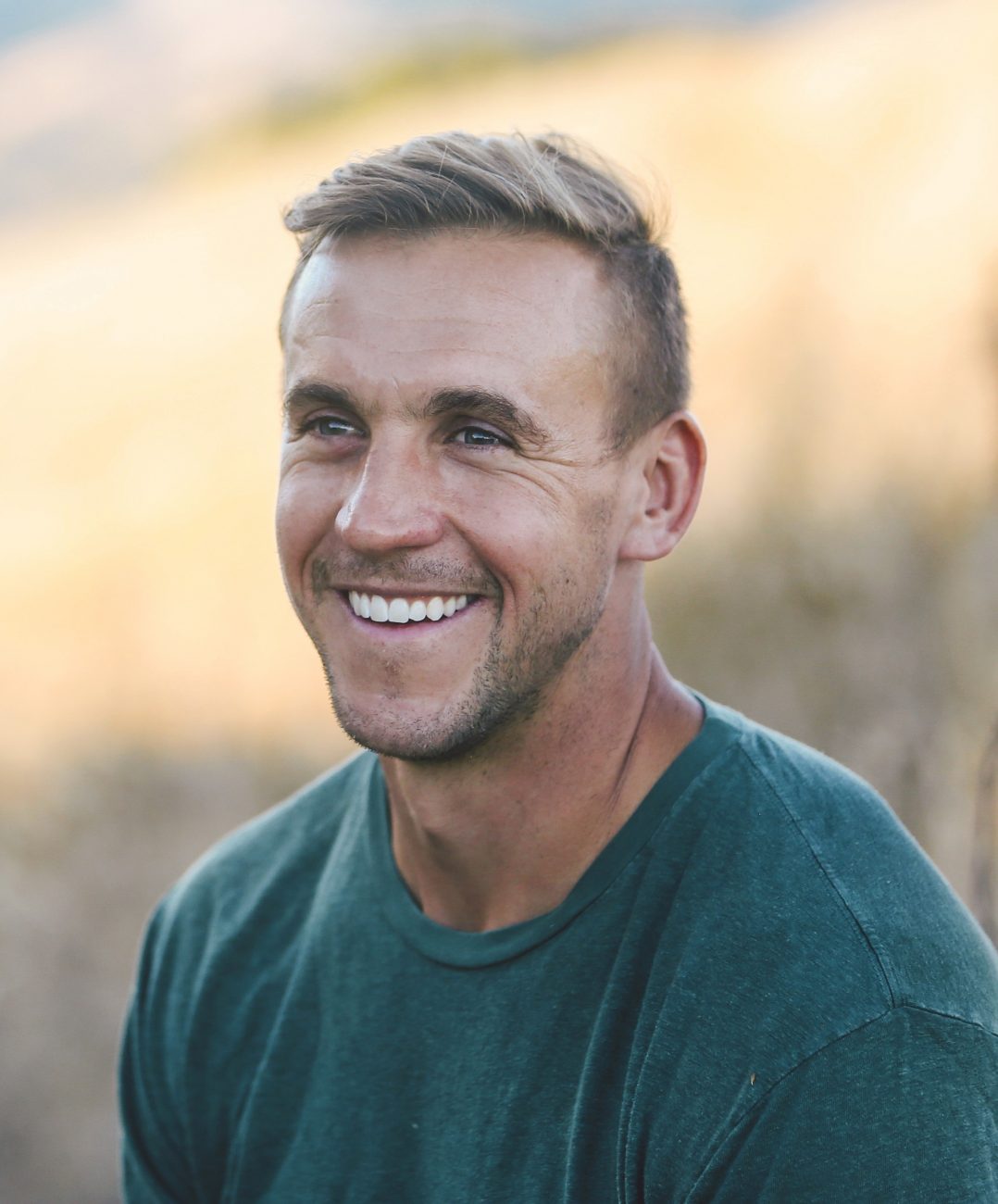

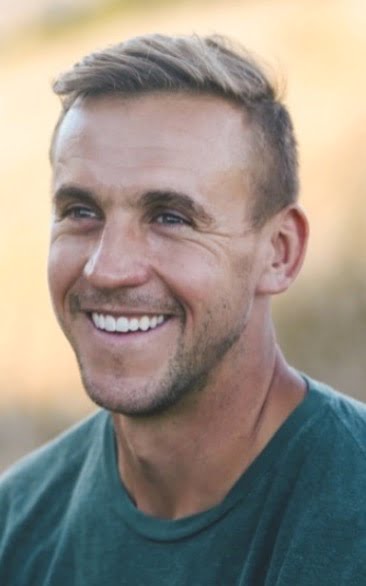
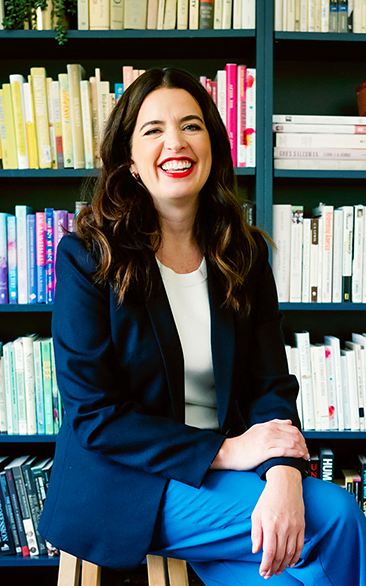










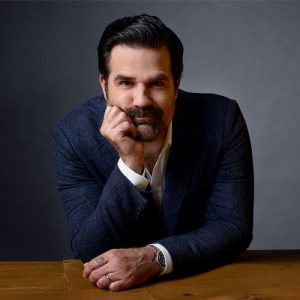
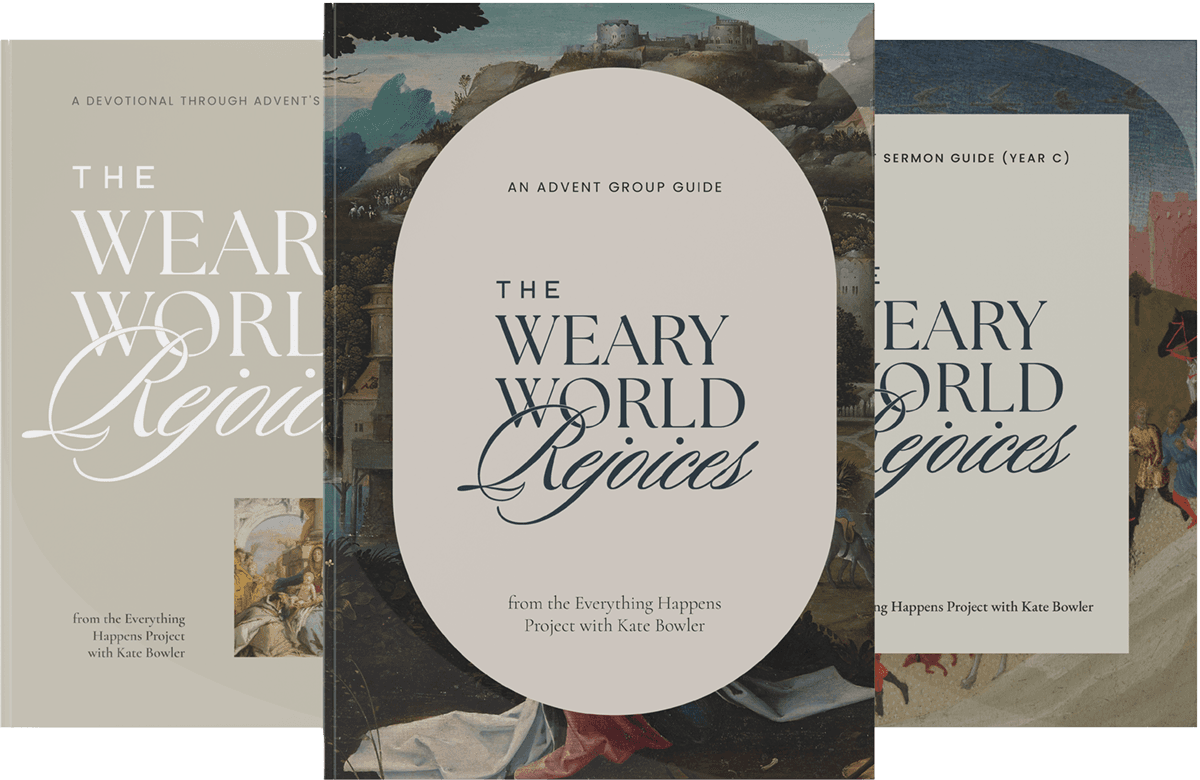
Leave a Reply